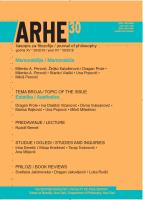Зашто Платонових ејдетских бројева има 10?
Why There Are 10 Plato’s Eidetic Numbers?
Author(s): Irina Deretić, Višnja KneževićSubject(s): Metaphysics, Ancient Philosphy
Published by: Филозофски факултет, Универзитет у Новом Саду
Keywords: eidetic numbers;decad;Plato;Greek mathematical concept of infinity;Pythagorean philosophy;
Summary/Abstract: Taking into account Aristotle’s testimonies on Plato’s account of eidetic numbers, we critically examine the question of their cardinality. We consider two mutually exclusive hypotheses: 1) according to the first, articulated in Plato’s Parmenides (143c ff.), the infinite sequence of the eidetic numbers is dialectically deduced from the One, 2) according to the second one, from Aristotle’s Physics (206b32) Plato limits the deduction of the eidetic numbers to a decad. We refute the first hypothesis, by showing that the outcome of the generation, as formulated in the Parmenides, cannot be considered to be the eidetic numbers, since they do not meet the key criteria for being eidetic (incomparability and mathematical inoperability). Furthermore, we argue for the second, “decad” hypothesis, and we draw its implications for the understanding of the hierarchy of the Forms. Our main claim is that Plato limits the eidetic numbers up to ten, because he presupposes the Greek concept of strictly potential infinity, which rules out the actual infinity. Accordingly, the decad might be regarded as the representative of the potentially infinite sequence of eidetic numbers.
Journal: Arhe
- Issue Year: 2018
- Issue No: 30
- Page Range: 181-190
- Page Count: 10
- Language: Serbian

